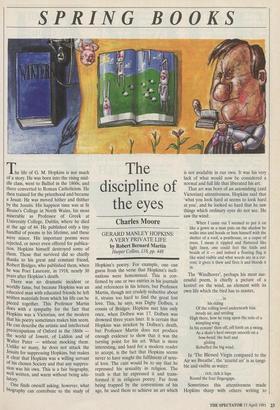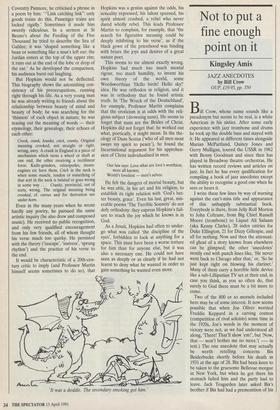SPRING BOOKS
The discipline of the eyes
Charles Moore
GERARD MANLEY HOPKINS: A VERY PRIVATE LIFE by Robert Bernard Martin Harper Collins, £18, pp. 448 The life of G. M. Hopkins is not much of a story. He was born into the rising mid- dle class, went to Balliol in the 1860s, and there converted to Roman Catholicism. He then trained for the priesthood and became a Jesuit. He was moved hither and thither by the Jesuits. His happiest time was at St Beuno's College in North Wales, his most miserable as Professor of Greek at University College, Dublin, where he died at the age of 44. He published only a tiny handful of poems in his lifetime, and these were minor. His important poems were rejected, or never even offered for publica- tion. Hopkins himself destroyed some of them. Those that survived did so chiefly thanks to his great and constant friend, Robert Bridges, who published them, when he was Poet Laureate, in 1918, nearly 30 years after Hopkins's death.
There was no dramatic incident or worldly fame, but because Hopkins was an educated man with educated friends he left written materials from which his life can be pieced together. This Professor Martin does with a sympathy for the fact that Hopkins was a Victorian, not the modern that his poetry sometimes makes him seem. He can describe the artistic and intellectual preoccupations of Oxford in the 1860s the world of Jowett, of Liddon and of Walter Pater — without mocking them. Unlike so many, he does not attack the Jesuits for suppressing Hopkins, but makes it clear that Hopkins was a willing servant of his chosen Society and that any suppres- sion was his own. This is a fair biography, well written, and warm without being adu- latory.
One finds oneself asking, however, what biography can contribute to the study of Hopkins's poetry. For example, one can guess from the verse that Hopkins's incli- nations were homosexual. This is con- firmed by one or two entries in his journals and references in his letters, but Professor Martin, though not crudely reductive about it, strains too hard to find the great lost love. This, he says, was Digby Dolben, a cousin of Bridges. Hopkins met him only once, when Dolben was 17. Dolben was drowned three years later. It is certain that Hopkins was stricken by Dolben's death, but Professor Martin does not produce enough evidence to show that it was the turning point for his art. What is more interesting, and hard for a modern reader to accept, is the fact that Hopkins seems never to have sought the fulfilment of sexu- al love. The cant would be to say that he repressed his sexuality in religion. The truth is that he expressed it and trans- formed it in religious poetry. Far from being trapped by the conventions of his age, he used them to achieve an art which
is not available in our own. It was his very lack of what would now be considered a normal and full life that liberated his art.
That art was born of an astonishing (and Victorian) attentiveness. Hopkins said that `what you look hard at seems to look hard at you', and he looked so hard that he saw things which ordinary eyes do not see. He saw the wind:
. . . When I came out I seemed to put it on like a gown as a man puts on the shadow he walks into and hoods or hats himself with the shelter of a roof, a penthouse, or a copse of trees, I mean it rippled and fluttered like light linen, one could feel the folds and braids of it — and indeed a floating flag is like wind visible and what weeds are in a cur- rent; it gives it thew and fires it and bloods it in.
The Windhover', perhaps his most suc- cessful poem, is chiefly a picture of a kestrel on the wind, an element with its own life which the bird has to master,
... in
his riding Of the rolling level underneath him steady air, and striding High there, how he rung upon the rein of a wimpling wing In his ecstasy! then off, off forth on a swing, As a skate's heel sweeps smooth on a bow-bend: the hurl and gliding Rebuffed the big wind.
In 'The Blessed Virgin compared to the Air we Breathe', the `azured air' is as tangi- ble and visible as water: ... rich, rich it laps
Round the four fingergaps.
Sometimes this attentiveness made Hopkins sharp with others: writing to Coventry Patmore, he criticised a phrase in a poem by him: ' "Link catching link": only goods trains do this. Passenger trains are locked rigidly.' Sometimes it made him sweetly ridiculous. In a sermon at St Beuno's about the Feeding of the Five Thousand he tried to describe the Sea of Galilee; it was 'shaped something like a bean or something like a man's left ear; the Jordan enters at the top of the upper rim; it runs out at the end of the lobe or drop of the ear.' As he developed the comparison, his audience burst out laughing.
But Hopkins would not be deflected: This biography shows the astonishing con- sistency of his preoccupations, running right through his life. As a very young man he was already writing to friends about the relationship between beauty of mind and beauty of body; he was searching for the `thisness' of each object in nature; he was teasing out the meaning of words — their etymology, their genealogy, their echoes of each other:
Crook, crank, kranke, crick, cranky. Original meaning crooked, not straight or right, wrong, awry. A crank in England is a piece of mechanism which turns a wheel or shaft at one end, the other receiving a rectilinear force. Knife-grinders, velocipedes, steam- engines etc have them. Crick in the neck is when some muscle, tendon or something of that sort in the neck is twisted or goes wrong in some way . . . Cranky, provincial, out of sorts, wrong. The original meaning being crooked, cf. curvus and for derivation see under horn.
Even in the many years when he wrote hardly any poetry, he pursued the same artistic inquiry (he also drew and composed music). He received no public recognition, and only very qualified encouragement from his few friends, all of whom thought his verse much too quirky. He persisted with the theory (`inscape', instress', 'sprung rhythm') and the practice of his verse to the end.
It would be characteristic of a 20th-cen- tury critic to imply (and Professor Martin himself seems sometimes to do so), that Hopkins was a genius against the odds, his sexuality repressed, his talent spurned, his spirit almost crushed, a rebel who never dared wholly rebel. This leads Professor Martin to complain, for example, that 'the search for figurative meaning could be deeply inhibiting to his verse', as if the black gown of the priesthood was binding with briars the joys and desires of a great nature poet.
This seems to me almost exactly wrong. Hopkins had much too much mental rigour, too much humility, to invent his own theory of the world, some Wordsworthian 'Hello birds! Hello sky!' idea. He was orthodox in religion, and it was in orthodoxy that he found artistic truth. In The Wreck of the Deutschland', for example, Professor Martin complains that the eroticism is at odds with the reli- gious subject (drowning nuns). He seems to forget that nuns are the Brides of Christ. Hopkins did not forget that: he worked out what, poetically, it might mean. In the the- ology of Duns Scotus (`who of all men most sways my spirit to peace'), he found the Incarnational argument for his apprehen- sion of Christ individualised in men.
Our law says: Love what are love's worthiest, were all known; World's loveliest — men's selves.
He felt the dangers of mortal beauty, but he was able, in his art and his religion, to establish its right relation with 'God's bet- ter beauty, grace'. Even his last, great, mis- erable poems 'The Terrible Sonnets' do not defy orthodoxy: they express Hopkins's fail- ure to reach the joy which he knows is in God.
As a Jesuit, Hopkins had often to under- go what was called 'the discipline of the eyes', forbidden to look at anything for a space. This must have been a worse torture for him than for anyone else, but it was also a necessary one. He could not have seen as deeply or as clearly if he had not learnt to deny what he wanted in order to gain something he wanted even more.
`It was a doddle. The secondary smoking got him.'



























































 Previous page
Previous page